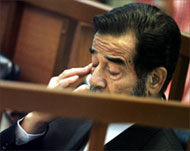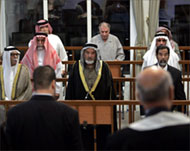Judge throws out Saddam’s brother
Saddam Hussein’s former intelligence chief was dragged out of court and manhandled by guards after arguing with the judge.

Chief judge Raouf Abdel-Rahman ordered Barzan Ibrahim, who is a brother of Saddam, to be removed on Monday after he accused the court of “terrorising” the defence.
The decision caused an American lawyer to attack the trial, saying unfair treatment was putting the defence at a “serious disadvantage”.
Iraqi guards grabbed Ibrahim by the arms and pulled him out, and when he tried to shrug them off, they held his left arm and pushed him into a wall as they tried to hustle him out the door, causing an uproar among the defence lawyers.
Ibrahim shouted as he was pulled out: “This is dictatorial.”
Abdel-Rahman sneered: “You know dictatorship.” He banged his gavel and lectured the defence to be quiet.
Mohammad Munib, a defence lawyer, shouted to the judge: “They are beating him in front of your eyes. Right at the door.
“How can we ask you to protect the defendant when they beat him right in front of you?”
Saddam sarcasm
After the uproar, Saddam stood and sarcastically suggested that the defence and defendants leave “if this will bring you calm and quiet and give you the opportunity to reach your verdicts. … If my presence bothers you, then I can withdraw and ask the defence team to withdraw as well.”
“You are before the world, which sees through this place, whether they hear from the so-called defendants or defence or the attackers,” he said, referring to the prosecution.
“People, Iraq’s money is being stolen.
 |
|
Saddam threatened to leave |
“Bloodshed is taking place every day, four times as much bloodshed in Dujail – I mean those who were sentenced to death.”
It was the second time in two weeks that Ibrahim has been thrown out for arguing with Abdel-Rahman.
Curtis Doebbler, an American on the defence team, accused the court of discriminating against the defence, saying it had ignored its requests, intimidated witnesses and rushed the defence, while giving the prosecution all the time it needed to present its case.
“We are at a serious disadvantage to the prosecution because of the way we have been treated by the court,” Doebbler told chief judge Raouf Abdel-Rahman.
“We want to work for justice. But that must start by having a fair trial. But under the current circumstances, that doesn’t seem possible. We ask that the trial be stopped to allow us adequate time to prepare our defence.”
Defence rushed
Doebbler said the prosecution took more than five months to present its case, while the court is rushing the defence, which began its arguments in April.
Abdel-Rahman has repeatedly demanded the defence should present full lists of witnesses.
“Our witnesses have been intimidated by the court and have been assaulted,” Doebbler said. “Several lawyers were assaulted as well.”
|
“We want to work for justice. But that must start by having a fair trial. But under the current circumstances, that doesn’t seem possible” |
Doebbler is one of two American lawyers, along with former US attorney-general Ramsey Clark, who have joined the defence team, though they have not attended every session.
Doebbler is an international lawyer who is currently working as a visiting professor at Najah University in the West Bank town of Nablus.
He said: “We have not received one reasoned opinion in response to our enormous written submitions.
“We’ve not been able to visit the place where the Dujail events took place. I have asked to visit the place for a year and I haven’t received any answer.”
The charges
Saddam and seven former members of his government are on trial for charges of crimes against humanity in a crackdown against Shia in the town of Dujail after a 1982 assassination attempt on Saddam.
 |
|
The defendants are on trial for |
They are accused of torturing women and children and wrongfully killing 148 Shia sentenced to death for the attack on the former Iraqi leader.
The defence has also sought an inquiry into claims by three of its witnesses that some of the 148 Shia supposedly killed in the crackdown are still alive.
Abdel-Rahman ordered an investigation, but there is no sign that one has begun and the three witnesses were among those he ordered arrested on perjury charges.
The defence argues that if some of the 148 are still alive, it casts the entire prosecution case in doubt, and has demanded all the prosecution’s documents should be reviewed for authenticity.